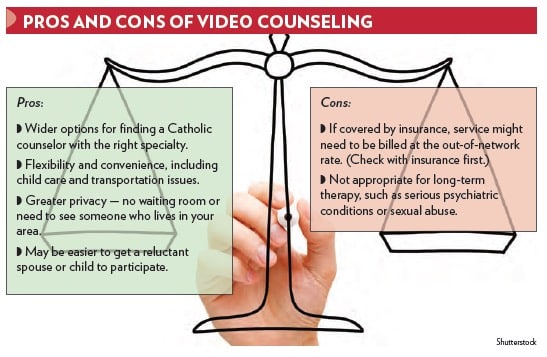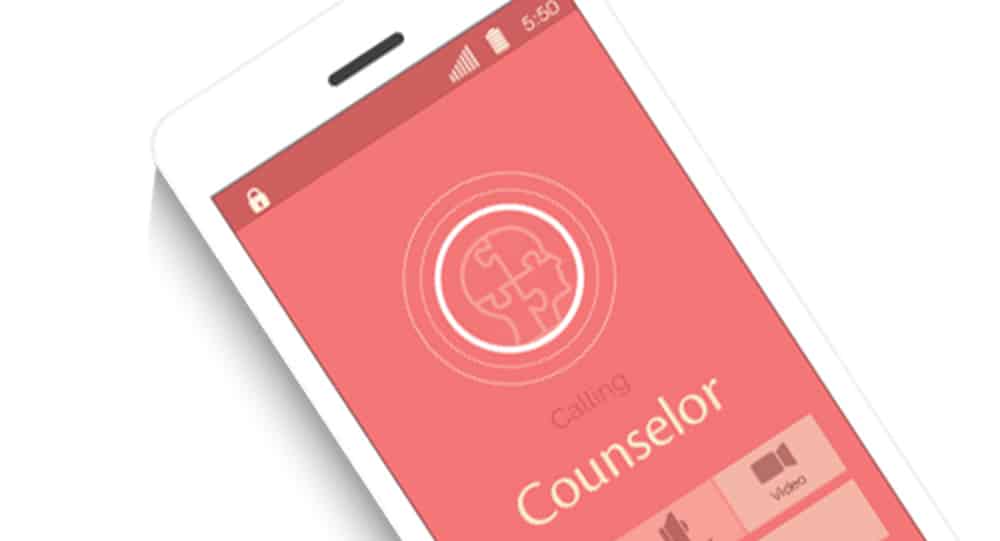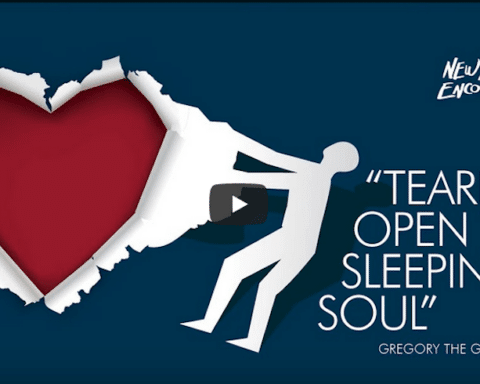Finding a counselor who shares your Catholic faith can be a challenge. Yet faith is often an important consideration since opposing world views might be a hinderance or even exacerbate a problem.
Long-distance counseling through video conferencing apps is a growing solution that enables Catholics to connect with a counselor who is right for them regardless of location. Many counselors are using video programs such as Skype, Zoom or other web-based programs.
Peter Kleponis — a licensed therapist with Marital Healing, assistant director of Comprehensive Counseling Services in Conshohocken, Pennsylvania, and author of “Restoring Trust: A Couple’s Guide to Getting Past Porn” (OSV, $19.95) — explained in an interview that two-thirds of his patients are long-distance. His specialized training in pornography and sexual addiction, combined with his Catholic faith, provides therapy not readily available in all geographic locations.
“My specialty is treating people with porn addiction, and there’s not many of us,” Kleponis said. “Several men I’m working with are in the military, and if they are deployed somewhere, how are they going to get help otherwise?”
Advantages
There are many benefits to doing counseling this way, Kleponis explained. “If they are in their own living room, I see their body language and expressions and their home, so it’s a glimpse into their world,” he said. “People with children don’t have to worry about getting a babysitter, and busy people find it easier to fit into their schedule.” He explained that some of his patients use lunch hours or a work break, using their car or office for counseling sessions.
Finding a good Catholic therapist with the right specialty cannot be understated, said Kleponis. “God is an important part of recovery,” he said. “People struggling with an addiction understand that and want to incorporate their Catholic spirituality. I will include adoration, Scripture and the sacraments; a non-Catholic therapist would not include this.”
At times, with patient permission, Kleponis will work together with a spiritual director. For example, if a patient needs to heal from a “father wound,” he might suggest asking for St. Joseph’s help.
Seeing a problem such as a porn addiction through a Catholic lens is important in order to get real help, Kleponis said. “It amazed me – one couple told me they were in marriage therapy before, and nothing improved. I broached the subject of porn, which was not brought up before, and it was the smoking gun they didn’t see. Then, they were able to progress.”
 Couple to couple help
Couple to couple help
Greg and Julie Alexander, founders of the nonprofit marriage ministry Alexander House, have helped over 3,000 other couples through marriage coaching, seminars and online marriage courses. They have been married for 30 years and have seven children and three grandchildren, but 19 years ago, they were planning to divorce. The Alexanders are not licensed counselors but offer “discipleship” long-distance, couple-to-couple, drawing on their own experience and extensive education and training.
“After the Holy Spirit led us out of the desert and redeemed our marriage, we felt God calling us to help others,” Greg Alexander said.
Just recently, they made the decision to offer their services and programs for free. “A lot of people out there are hurting and need help,” he said. “We don’t want anything to get in the way of couples receiving that help. Donations are welcome, but there are no fees.”
He explained that the Catholic faith guides everything that they do. “If you look at the problems in our culture, much of it goes back to ignoring our Catholic teachings on contraception and pornography and marriage.”
Julie Alexander explained that they only work with couples, but sometimes one spouse is more reluctant than the other to seek outside help. Being able to get counseling from home can help ease that situation.
“Often, we will have a wife sitting up close to the screen and the husband sitting farther back,” Julie Alexander said. “But then, soon, he’s coming closer to the screen and feeling more comfortable.” She also pointed out that sometimes couples are already separated or perhaps a spouse is away in service, so the ability to come together through these apps is an effective way to work together.
Two case stories
Clare (name has been changed for privacy) and her husband have used counseling for their daughter, Stephanie (name has been changed for privacy), for severe anxiety, depression, eating disorders and ADHD.
“She has had a whole cocktail of emotional and psychological problems,” Clare said. “We have always looked for good Catholic counseling to reinforce our values.”
There have been ups and downs with her treatment including a “cautionary tale,” according to Clare, of increased negative behaviors while seeing a therapist they later discovered had encouraged Stephanie to go against Catholic beliefs.
| Catholic Counseling Services |
|---|
Check with your parish for referrals. |
Clare and her husband learned to screen carefully and decided to stick with Catholic therapists. She said they relied on a licensed psychiatrist who uses Skype with their daughter.
“Her situation is ongoing and hasn’t been easy,” Clare said. “(Stephanie) is an adult now, but we felt we were doing right by her to do everything within our power to find help that reinforced our faith.” She explained that using Skype made it easy for her to screen the doctor ahead of time and have her daughter set up appointments that fit her schedule.
Anne (name has been changed for privacy) and her husband received marriage counseling through Skype.
“At the time, we did not know of any Catholic counselors,” she said. “My husband was also reluctant to get outside help. This was the perfect solution.”
The counselor talked with each of them separately and then had a third session with the couple together.
“Really, that’s all it took,” Anne said. “We just needed a little help, but that little help made a big difference.”
Patti Maguire Armstrong writes from North Dakota.





